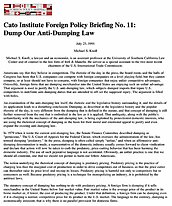Americans say that they believe in competition. The rhetoric of the day in the press, the board room, and the halls of Congress has been that U.S. companies can compete with foreign companies on a level playing field, but they cannot compete, or at least should not have to compete, with foreign companies that enjoy unfair competitive advantages. Ostensibly, foreign firms that are dumping merchandise into the United States are enjoying such an unfair advantage. That argument is used to justify the U.S. anti-dumping law, which subjects dumped imports that injure U.S. competitors to indefinite anti-dumping duties that are intended to off-set the supposed injury. The argument is filled with holes.
An examination of the anti-dumping law itself, the rhetoric and the legislative history surrounding it, and the details of its application leads to a disturbing conclusion: Dumping, as described in the legislative history and the popular rhetoric of the day, is very different from the dumping that is defined in the statute, and that concept of dumping is still further removed from the one that is embodied in the law as it is applied. That ambiguity, along with the public’s unfamiliarity with the mechanics of the anti-dumping law, is being exploited by protectionist domestic interests, who are using the rhetorical concept of dumping as the basis for their moral and emotional appeal to justify and even expand the existing anti-dumping law.
About the Author

This work is licensed under a Creative Commons Attribution-NonCommercial-ShareAlike 4.0 International License.
